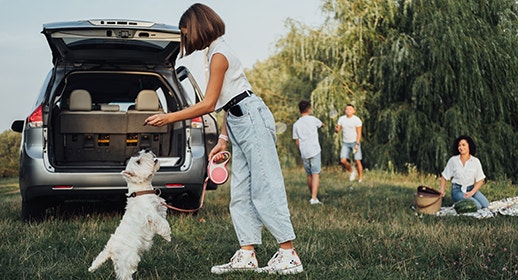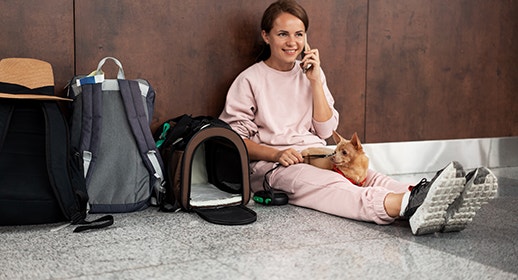- Homepage
- Discover a dog friendly world
- Dog-friendly TRAVEL
- How to keep your dog happy & healthy on holiday


There's nothing quite like exploring and going on adventures with your dog by your side. But while holidays are fun for us, it's important to remember that our furry friends need a little extra care to stay happy and healthy when new environments. To make sure your dog stays safe and well, here are a few things you can do and keep in mind.
Soothe any travel anxiety
Our furry friends love routine, so travelling can sometimes be a bit stressful for them. Keep an eye out for signs of anxiety like whining, shaking, or restlessness. If you notice your dog is feeling uneasy while on the road, try creating a comfy haven for them in their pet carrier or a spot on one of the seats (making sure they’re secured with a doggy ‘seatbelt’). You can make it feel extra cosy with blankets and some of their toys. If they’re not used to being in the car or a pet carrier, it’s also a good idea to gradually introduce them to it in the lead up to your trip.
Once you’ve arrived at your destination, you can ease your dog’s anxiety by creating a cosy area in your accommodation, with familiar items like their bed, toys and blanket. Keeping them entertained and distracted with toys or puzzle games, and some tasty treats, can also help combat anxiety.
Manage motion sickness
A bumpy ride can make dogs feel queasy, especially if they’re just a puppy. So, if your dog is prone to motion sickness, give them some practice runs in the car with short trips before embarking on a long journey. Create a comfy and cosy spot for them, where they won't slip and slide, and keep the car nice and cool. Be sure to also take regular breaks so they can stretch their legs and get some fresh air.
Timing their meals well is important too. Feed them at least 2-3 hours before you hit the road, and give them a good walk to help settle their stomach. If you’ve tried a few things and your dog continues to experience motion sickness, have a chat with your vet about the possibility of travel sickness medication.
Help them adjust to the climate
Whether you're chasing sunshine or exploring snowy landscapes, adjusting to a different climate can be a bit of a change for your furry friend. If you're basking in warmer weather, remember that it's easy for them to get dehydrated, especially when they're having fun outdoors. So always have fresh water and a portable bowl handy, and keep an eye out for signs like excessive panting or lethargy. A cooling mat is also a good idea, as it gives them a comfy spot to chill out if they're feeling the heat. And remember to never, ever leave them alone in a hot car!
On the flip side, if you're venturing into colder climates, be mindful of your dog’s paws on icy surfaces and consider getting them a cosy coat to keep them warm.
Keep them active
It's all about finding the right balance between exercise and rest while you’re on holiday. So, be sure to plan regular walks and playtime with them. Little bursts of engaging activity that let them stretch, sniff around, and release some pent-up energy, without tiring them out too much, are perfect. A quick game of fetch or a leisurely stroll can make a world of difference in keeping your furry friend content on their trip.
Be safe
Exploring new places with your dog is exciting, but unfamiliar environments can sometimes present new dangers. Remember tick and flea prevention before your trip, especially if you're heading to mainland Europe where tick-borne diseases are more common. Also be extra cautious around water, steering clear of stagnant or discoloured water that could contain harmful algae or contaminants.
It’s also advisable to keep your dog supervised and on a lead while in unfamiliar places, to prevent them from wandering off or encountering hazards. It’s also best to avoid interactions with unfamiliar animals, especially street dogs or wildlife, to minimise the risk of bites or disease transmission.
Keep an eye on their health
While travelling with your dog, keep an eye on them for any signs of discomfort or illness, like vomiting, excessive scratching, or changes in their appetite. A quick daily check for ticks, cuts, or irritations is also a great idea, as these new environments can sometimes harbour parasites, allergens, or other little hazards. By staying attentive, you can quickly address any potential issues and keep your furry friend thriving throughout your holiday together.
Pinpoint vets in your destination
Even when you’re super careful and you plan ahead, unexpected health issues or accidents can still pop up. So, before you leave for your holiday, it's a great idea to do a little research and locate nearby vet clinics in your destination. Having this information readily available will give you peace of mind that you're prepared if your dog were to need care while you’re away.
Travelling with your dog can be a wonderful experience. And by taking the time to prepare, and paying close attention to your furry friend's needs, you can relax and enjoy a fantastic holiday together, filled with fun, adventure, and plenty of happy tail wags! Be sure to explore the rest of our doggy travel tips on the Cesar® blog.





 Tesco
Tesco  ASDA
ASDA  Morrisons
Morrisons  Sainsburys
Sainsburys  Pets at Home
Pets at Home  Amazon
Amazon  Ocado
Ocado